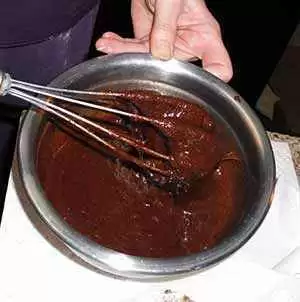Celiac.com 12/09/2009 - I vividly recall the day I received my First Communion, the Sacrament a young Catholic child waits years to make. I still have the group picture of my second grade Catholic School Class; the girls all wearing white dresses with veils, and the boys, suits with clip on neckties. I stood in the front row beside my friends, excited that our time had arrived—the moment when we were finally able to join our parents in receiving the Body and Blood of Christ.
In my family we went to Church every Sunday morning, and celebrated Holy Days, while my parents struggled to put us through Catholic School; paying for our education so we’d learn religious studies along with math, reading, and science. Both of my parents also attended Catholic School, in a time where most of the educators were Nuns and Brothers. When I was born, after Vatican 2, the Catholic Church had evolved, in an attempt to grow with a changing society. The Nuns who taught me in school no long wore their religious habits, but rather, the same clothing as lay teachers; yet always with a crucifix worn over their sweaters and dress shirts.
Celiac.com Sponsor (A12):
One of my favorite Church songs was titled Gift of Finest Wheat. The lines I distinctly remember, and continue singing along with at Church as an adult are, “you satisfy the hungry heart, with gift of finest wheat,” and “come give to us, oh saving Lord, the Bread of Life to eat.” Perhaps my second grade class sang Gift of Finest Wheat before receiving the sacrament of Holy Communion, that spring day, many years ago. I followed the rest of my class toward our Parish Priest, prepared to hear the words, “The Body of Christ,” before I responded with nervousness and reverence, “Amen.” My hands probably shook while placing the Communion Host in my mouth, tasting the dry unleavened wheat bread.
Twenty five years after receiving my First Holy Communion, I was diagnosed with celiac disease. In the weeks following this life changing diagnosis, my focus was on the dietary restrictions I would now need to follow in order to heal my body. Not once did I contemplate the ramifications of my Catholic faith. In fact, I continued receiving the Communion host for several months, refusing to alter my reception of this central part of my religious life. When I continued to remain ill, particularly after receiving my weekly Eucharist, I asked a dietitian if I should forgo Communion. She answered with a sympathetic, “Yes.”
So what happens when a practicing Catholic learns that the Communion Host, the Body of Christ, the pinnacle of Mass, is making them sick? According to Cannon 935 of the 1983 Cannon Law, “bread for Communion must be made of wheat alone, and no substitutes which would invalidate the Sacrament.” In short, the Catholic Church forbids the use of Communion Hosts not made of wheat. A practicing Catholic may continue to receive Communion through the Blood, or wine, alone—without the Host. It is also advised that a Parishioner speak with their Priest to see if a separate Chalice is available to avoid cross-contamination, as some still dip the Host into the wine during the sacrament.
The answer seems simple, doesn’t it? Go to Church and receive Eucharist though the Blood of Christ. But really—how simple is it to forgo on what always seemed to be an essential part of your upbringing, your past, your faith? Communicate with your Priest, educate your Eucharistic Ministers, and continue to practice what you believe in.
A helpful website for Catholics with Celiac Disease: Open Original Shared Link





.webp.df2eeb320e7f88484720ec946e1e9953.webp)





Recommended Comments